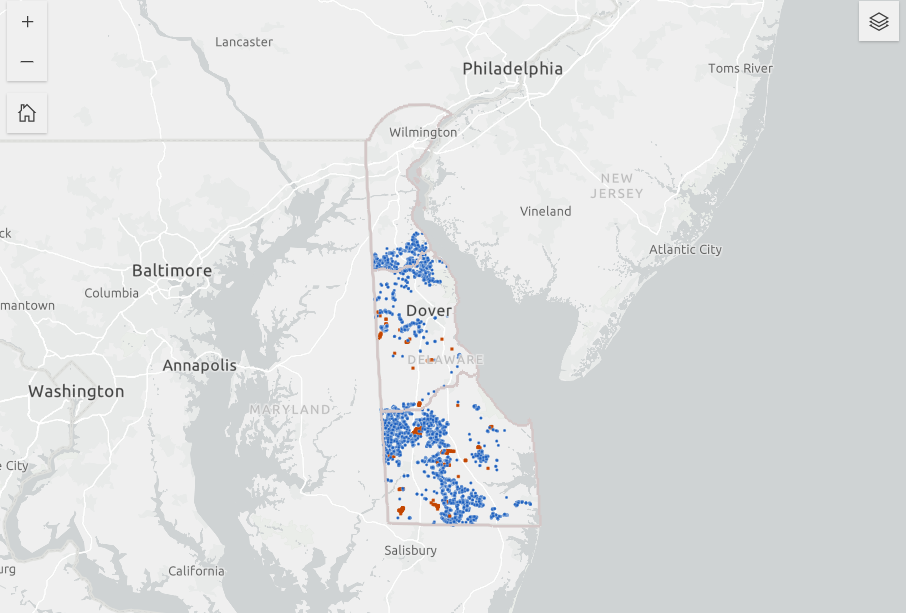Delaware continues to be a heavy hitter when it comes to high-speed broadband access.
A recent report found that Delaware ranks No. 4 in broadband speed out of the 50 states. An analysis of internet speed using the online resource Speedtest, published by parent company Ookla on Oct. 1, demonstrates that the recent developments in broadband access throughout the state may be paying off, according to executive director of the Delaware Broadband Office (DBO) Roddy Flynn.
“We are not only making sure Delaware is the first state to be fully connected, but that we’re using future-proof technologies, and we are ready for the economy and society of the future,” Flynn said in a post on LinkedIn, noting the work the office, and its parent office Delaware Department of Technology and Information, has done since the DBO launched in March 2023.
Only Connecticut, North Dakota and Maryland have more residents that meet or exceed the Federal Communications Commission’s minimum standard for fixed broadband speeds.
About 63% of Delawareans in the study have access to the minimum standard or higher, meaning download speeds are at least 100 megabits per second and upload speeds are at least 20 megabits per second. At those speeds, things like streaming a movie or participating in a Zoom call should not lag, and it offers more reliable connections for multiple devices.
The new benchmarks for what can be called “high-speed internet” went into effect in March 2024, upping the metrics from their 2015 values of 25 Mbps downstream and 3 Mbps upstream, a broadband speed that was considered high speed in the 2010s, but can’t support the average household’s internet use today
Beyond the top four, other states with 60% or more residents using the minimum speed or higher are Rhode Island, Tennessee, Utah, New Hampshire and Virginia.
Delaware vies to become the top spot for broadband connectivity
The Infrastructure Investment and Jobs Act of 2021 and its $42.5 billion in funding for the Broadband, Equity, Access and Deployment (BEAD) program dramatically increased internet access efforts.
Of the nine states where over 60% receive the minimum broadband speeds, all of them have been approved for BEAD funding. However, that funding won’t impact access to high-speed internet until 2025 at the soonest.
In its quest to become the first state with 100% high-speed internet access, the Delaware Broadband Office has held digital equity workshops, roundtable discussions, issued surveys and put teams on the ground to locate isolated homes that do not appear on the Federal Communication National Broadband Map.
The timeline for the goal of full high-speed coverage is through 2030.
The biggest internet infrastructure challenges in Delaware are in rural Sussex and Western Kent counties, as well as parts of New Castle County. Rural areas, especially, lack the fiber internet infrastructure needed for reliable broadband.
Infrastructure isn’t the only barrier Delawareans face.
“When it comes to the other barriers that people face, it’s really spread all across the state and impacts our seniors, low-income families, the incarcerated populations,” Flynn said in an interview with Technical.ly last year. “What we hear the most about the barriers they face in accessing the internet are affordability, device access and being afraid of getting scammed.”
About 7,000 locations in Delaware were funded under the pandemic-era American Rescue Plan Act and the CARES Act. Access to BEAD funding will help the state extend last-mile broadband infrastructure throughout the state, as laid out in its 187-page Digital Equity Plan. The plan also includes ways the state will deploy both high-speed internet and device access for underrepresented communities, including seniors, low-income residents and residents with disabilities.
The plan’s federal approval in Feb. 2024 made Delaware the second state in the nation to reach that milestone. In May 2024, Delaware’s BEAD grant proposal was approved, giving the state access to $107 million in federal funding to connect around 6,500 homes in its most remote areas.
“[We are] making sure that Delaware is a place that not only can you subscribe to the internet, but you can afford to,” Flynn said, “and you’re able to take advantage of all the resources that so many people take for granted.”
➡️Read more
- 5 questions with Delaware Broadband Director Roddy Flynn
- Watch this roundtable discussion on Delaware's Digital Equity Plan
- What internet speed do you really need?
Before you go...
Please consider supporting Technical.ly to keep our independent journalism strong. Unlike most business-focused media outlets, we don’t have a paywall. Instead, we count on your personal and organizational support.
3 ways to support our work:- Contribute to the Journalism Fund. Charitable giving ensures our information remains free and accessible for residents to discover workforce programs and entrepreneurship pathways. This includes philanthropic grants and individual tax-deductible donations from readers like you.
- Use our Preferred Partners. Our directory of vetted providers offers high-quality recommendations for services our readers need, and each referral supports our journalism.
- Use our services. If you need entrepreneurs and tech leaders to buy your services, are seeking technologists to hire or want more professionals to know about your ecosystem, Technical.ly has the biggest and most engaged audience in the mid-Atlantic. We help companies tell their stories and answer big questions to meet and serve our community.
Join our growing Slack community
Join 5,000 tech professionals and entrepreneurs in our community Slack today!

The man charged in the UnitedHealthcare CEO shooting had a ton of tech connections

Delaware students take a field trip to China using their tablets and ChatGPT

From rejection to innovation: How I built a tool to beat AI hiring algorithms at their own game




